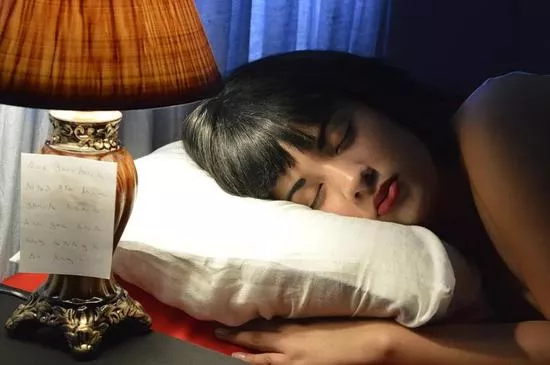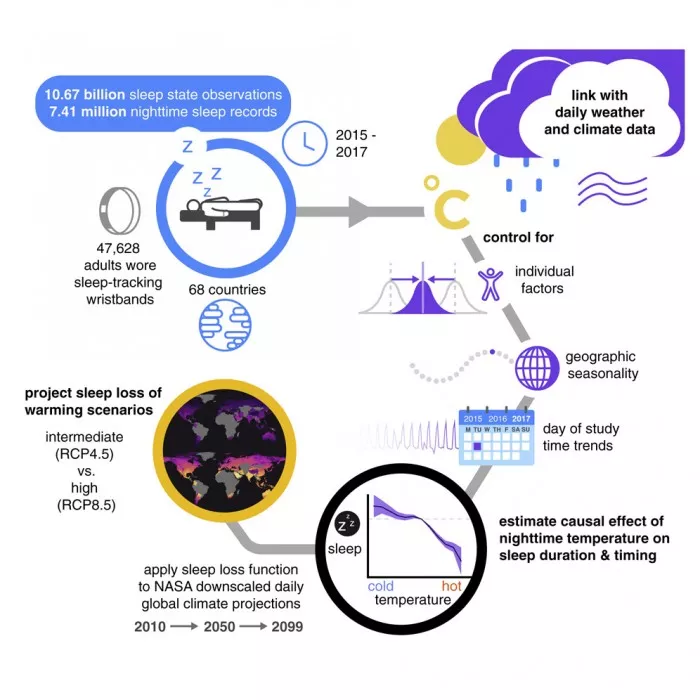Most studies on the impact of climate change on human life focus on how extreme weather events affect economic and social health outcomes in a wide range. However, climate change may also have a strong impact on basic human daily activities - including a range of behavioral, psychological and physical outcomes critical to health. Published in [one earth] on May 20( https://www.cell.com/one-earth/fulltext/S2590-3322 (22)00209-3?_ returnURL=https%3A%2F%2Flinkinghub. elsevier. In a study in the journal com% 2freetrieve% 2fpii% 2fs259032222002093% 3fshowall% 3dtrue, investigators reported that rising ambient temperatures had a negative impact on human sleep around the world**

According to the researchers, their findings suggest that by 2099, suboptimal temperatures may reduce sleep time by 50 to 58 hours per person per year. In addition, they found that the effect of temperature on sleep loss was much greater for residents of low-income countries, as well as older people and women.
Kelton minor of the University of Copenhagen, the lead author of the study, said: "our results show that sleep - a basic recovery process indispensable to human health and productivity - may be degraded by rising temperatures. In order to make informed climate policy decisions, we need to better consider the possible impact of today's social greenhouse gas emission options on the future climate."
It has long been recognized that hot weather can increase deaths and hospitalizations and worsen human performance. However, the biological and behavioral mechanisms behind these effects have not been well understood. Recent self-reported data from the United States show that subjective sleep quality decreases during hot weather, but it is still unclear how temperature fluctuations affect changes in objective sleep outcomes for people living in various climates around the world.

"In this study, we provide the first global scale evidence that higher than average temperatures erode human sleep. We show that this erosion occurs mainly by delaying people's time to sleep and waking up early in hot weather," minor said
For the study, the researchers used anonymous global sleep data collected from an accelerometer based sleep tracking wrist strap. The data include 7 million nocturnal sleep records from more than 47000 adults in 68 countries across all continents except Antarctica. Measurements of the wristband type used in this study have previously been shown to be consistent with independent measurements of arousal and sleep.
The study showed that on very hot nights (more than 30 degrees Celsius), sleep time was reduced by an average of more than 14 minutes. As the temperature rises, the likelihood of getting less than seven hours of sleep increases.
"Our bodies are highly adapted to maintain a stable core temperature, which is what our lives depend on," minor said. "However, every night, without most of us knowing it, they do a great thing - they drain heat from our core to the surrounding environment by expanding our blood vessels and increasing the blood flow to our hands and feet." He added that in order for our bodies to transfer heat, the surrounding environment needs to be colder than us.
Early controlled studies in the sleep laboratory found that when the room temperature is too hot or too cold, the sleep of humans and animals will become worse. But the study is limited by people's behavior in the real world: they change the temperature of their sleep environment to make it more comfortable.
In the current study, the investigators found that under the normal life rules, people seem to be much better at adapting to the colder external temperature than to the warmer conditions. "Higher external temperatures have been eroding sleep in different seasons, demographics and climate settings, and the amount of sleep loss increases as the temperature increases," minor said
An important observation is that people in developing countries seem to be more vulnerable to these changes. More common air conditioning in developed countries may have played a role, but researchers cannot determine the reason because they do not have data on the use of air conditioning in subjects. The researchers also pointed out that because they found convincing evidence that the impact of warming on sleep loss is unequal on a global scale, the new study should specifically consider more vulnerable groups, especially those living in the hottest and historically poorest areas of the world.
In future work, the team hopes to work with global climate scientists, sleep researchers and technology providers to expand the scope of global sleep and behavior analysis to other populations and environments. In addition, they are interested in studying the impact of rising outdoor temperatures on the sleep outcomes of incarcerated people in hot climates, who may be particularly limited in their access to air conditioning.